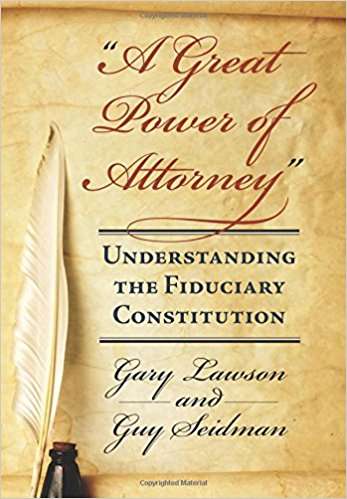The Volokh Conspiracy
Mostly law professors | Sometimes contrarian | Often libertarian | Always independent
Announcing the Cooley Book Prize
Gary Lawson & Guy Seidman awarded $50,000 for their book, A Great Power of Attorney:
I am very pleased to announce that, on April 20th, the Georgetown Center for the Constitution will award its first annual Thomas M. Cooley Book Prize of $50,000 to honor a book that makes an important contribution to our understanding of the Constitution. The first recipients will be professors Gary Lawson (Boston University School of Law) and Guy Seidman (IDC Herzliya—Radzyner School of Law) for their book, A Great Power of Attorney: Understanding the Fiduciary Constitution (Kansas University Press, 2017), which explores the type of legal document that is the Constitution and how this affects the powers it grants to government officials and the duties they owe to the public.

To commemorate the book, a day-long by-invitation-only Symposium will be held that day featuring critical papers about the book. At the Symposium, a group of constitutional professors from area law schools will join Professors Lawson and Seidman and paper authors Ethan Leib (Fordham), John Mikhail (Georgetown), Richard Primus (Michigan) and Suzanna Sherry (Vanderbilt) to discuss the issues raised by the book and papers—which will be published in a special issue of the Georgetown Journal of Law and Public Policy.
The Cooley Book Prize is named after renowned legal scholar Thomas McIntyre Cooley. Cooley was a longstanding Chief Justice of the Michigan Supreme Court, and a professor at the University of Michigan Law School, where he also served as the Dean. He authored several highly influential books, including A Treatise on the Constitutional Limitations Which Rest Upon the Legislative Power of the States of the American Union. In December, the Georgetown Center for the Constitution's annual Salmon P. Chase Distinguished Lecture and Faculty Colloquium will commemorate the 150thanniversary of the publication of Cooley's Constitutional Limitations.
Editor's Note: We invite comments and request that they be civil and on-topic. We do not moderate or assume any responsibility for comments, which are owned by the readers who post them. Comments do not represent the views of Reason.com or Reason Foundation. We reserve the right to delete any comment for any reason at any time. Comments may only be edited within 5 minutes of posting. Report abuses.
Please to post comments


Speaking of Constitution, do any of the Conspiracy bloggers plan to talk about the constitutionally questionable Mueller investigation?
The founding generation often spoke of the Constitution as a fiduciary document?or as a "great power of attorney," in the words of founding-era legal giant James Iredell.
I hope Barnett can share enough content from the new book to back the claim that "the founding generation" "often" spoke that way. Which founders, when, in what documents?
For instance, I don't recall seeing the phrase in Madison's notes on the federal convention, but of course I wasn't looking for it specifically, so may have missed remembering it. But neither do I recall seeing it in Ron Chernow's bulky biography of Hamilton. A Google search for the phrase used with "George Washington" seems to turn up nothing. Nothing for Franklin, either. Founder James Wilson, who served on the same Supreme Court as Iredell, wrote with explicit intent to explain the theoretical basis of the Constitution, but seems not to have regarded it as anything like "a great power of attorney."
But of course there are lots more founders, who apparently "often" spoke that way. If Professor Barnett could provide the examples, it might change the way folks think about the Constitution. The authors could really be on to something important.
Oops, re-reading I see the quote referencing Iredell isn't in Barnett's OP. I found it by Googling "great power of attorney." Iredell's name was the one which came up as a source. Iredell was a young North Carolinian pro-federalist advocate, who was appointed by Washington to the first Supreme Court after he helped carry the debate for ratification of the Constitution in North Carolina.